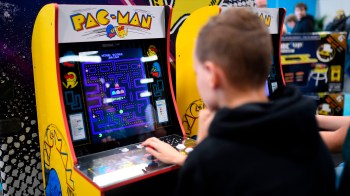
Inside the wide world of indie video games
We watch one movie a month for “Econ Extra Credit.” This month, it’s a look inside the world of independent video games with the documentary film “Indie Game: The Movie.” Released in 2012, it follows several teams of game designers through the life cycle of building a game. But it’s not necessarily a video game for mass consumption; these developers are interested in something else.
For more on the distinction, “Marketplace Morning Report” host David Brancaccio spoke with Shawn Pierre. He’s a Philadelphia-based game designer, teaches at New York University’s Game Center and is chair of the Independent Games Festival.
David Brancaccio: It’s not that a big, corporate, AAA game lacks vision, or an identity, or a sense of itself. But I think the indie games are a little bit more about … what would you say? About the vision of the creators, rather than maybe an obsession with what audience research suggests about the audience?
Shawn Pierre: Yeah, that’s a good point. That’s one of the things that I think indie developers are able to take advantage of. The fact that — and you do have independent studios, and people who own companies, and they employ people, so they have to pay attention to the market in some degree or some way — but you also have many indies who say, “Hey, this is something I’m feeling right now. I want to make a game that expresses this. I know it probably won’t sell a lot of copies, or I know that this is something that I just really need to make. And it doesn’t matter if anyone buys it, or maybe I’ll just give it away for free. Put it up online, maybe people can donate.”
Brancaccio: It’s a really rich environment. I mean, there’s so much stuff. Some of it’s pretty slick; some of it’s pretty rough. A lot of it really touches real issues that game developers feel viscerally.
Pierre: There are so many different types of games up on itch.io. And there’s this thing called game jams, where people make games over a short period of time, whether it’s a couple of weeks or a couple of months or a couple of days. But a lot of those games are things that, yeah, they could be in pretty rough shape, but they really show some spark and creativity that, I think — if put in front of a good number of people, or the right number of people or two people who really enjoy it — it really gives some of those developers confidence to continue working on their thing. But sometimes it’s great for just getting a short idea that you really want to have completed out in the world.
Brancaccio: Since it takes a while to do this and the returns are uncertain … I mean, what do you say to people who say, “I want to develop indie games for a living”?
Pierre: The game industry is going through some pains right now, where there are a lot of folks being laid off. Some bigger companies are buying up smaller companies, and then all sudden they’re saying, “Never mind,” and then they shut the company down. And it’s really, really messy. A lot of these folks who are getting laid off and fired, they deserve a lot better — deserve to be treated like people and not just like throwaway assets.
What I tell folks is that making games teaches you so much more than only game development. There’s a lot of user interaction, and people design, and thinking about the way other folks think and interact that goes into making games. There’s storytelling, and there’s visual design. So for anyone who’s making games, if they’re worried about it, I would say, you know, don’t limit yourself to only making games. Think about everything else that you can do, other things that you can do. Find a job that can help you pay for bills, and put you know a roof over your head, and buy food and all that stuff. And keep on working on your art. Don’t forget to take care yourself. If you can’t take care of yourself, then you can’t make the things that you really love.
There’s a lot happening in the world. Through it all, Marketplace is here for you.
You rely on Marketplace to break down the world’s events and tell you how it affects you in a fact-based, approachable way. We rely on your financial support to keep making that possible.
Your donation today powers the independent journalism that you rely on. For just $5/month, you can help sustain Marketplace so we can keep reporting on the things that matter to you.


















